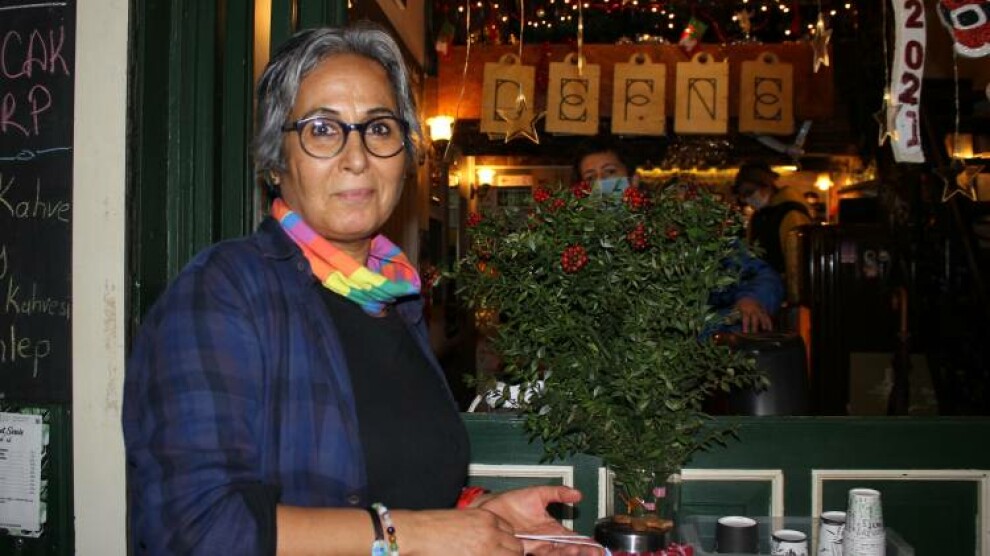Small shopkeepers during the pandemic
Small shopkeepers that have managed to survive during the pandemic are in a very difficult situation. Outdoor dining has been banned in Turkey due to the Covid-19 pandemic. Cafe owners are resisting not closing their café restaurants by delivering food to the customers. Fadime Özbudun is one of them resisting not closing their café restaurants. She states that they have been left alone during that period and they will not be able to return if their restaurants are closed for a long time again.

RÜYA HÜSEYİNOĞLU
İzmir- The year 2020 will be remembered as the spiritual and economic collapse of the individual and society even if many years have passed. The covid-19 outbreak caused large-scale destruction in many countries around the world in early 2020. Small-scale enterprises, unfortunately, have disappeared one by one in this painful period while even centuries-old giant companies have declared bankruptcy due to the ongoing economic crisis.
In our country, small shopkeepers had already suffered before the pandemic outbreak. Many of them had to close their shops due to bans that began to be imposed in March 2020. These shops are not only enterprises but also a symbol for cities and they serve the cultural texture of cities. The use of tables and chairs has been banned for the restaurants and this ban keeps these busiest places empty.
This ban imposed to protect our health brings these café restaurants to a dead end. Small café restaurants have tried to survive alone by delivering food to customers. Fadime Özbudun has run a café restaurant called Defne Café in Alsancak quarter of İzmir for 13 years. We interview her about her story and the effect of the pandemic on her business.
Her regular customers keep her café alive
Fadime's relatives and friends call her “Fadiş”. In a short time, we also began to call her Fadiş. Before opening her café, she worked in exporting food. She worked for different companies and then she established her own company. When she heard the café to be handed over, she closed her company and took steps to run the café.
“I think every woman has a dream to open a small café. To be honest, I don’t know how to cook; but I learned to cook the food in the menu in a week. Immediately, we served the food to customers. It has been 13 years. At first, I couldn't do most of the things I had said I would do in that small café. I worked in the toilet, kitchen, and service. My goal was just to provide a good service. Of course, there are many difficulties. There are only one or two women business owners on this street. Actually, the regular customers keep this café alive.
“We have left alone during this period”
Since the restaurants, cafes, and bars are the focal point of social life, they are unfortunately among the places that are most economically affected by the pandemic. Although the package service covers the urgent expenses of enterprises, it is not enough to keep alive in this sector. In the last 9 months, there has been a loss of approximately 65% in the workflow of these places. Furthermore, some of these enterprises don’t have the opportunity to provide package service due to the ingredient of their menus.
Fadime Özbudun says, “I paid my past rents as of June. Now, we are facing the second wave of the pandemic. My café keeps working due to the quality of our food, customer satisfaction, and our good relationships with them. If I can earn 300-500 Turkish Lira every day, it is a good income. But we have to pay for invoices and rent. I am lucky because my shop owner said, “We have come together until this time, so I don't want rent at such a difficult time.” When I heard that, tears came to my eyes. But I know some colleagues who have not been able to pay their rent since the beginning of the pandemic. Actually, we have been left alone during this period.”
Hundreds of places were closed
Restaurants, cafes, and bars were reopened as of June 1, 2020 in Turkey. But they have had to deliver food to customers due to the increasing cases. Shopkeepers have faced a serious economic impact during the second wave of the pandemic.
“During the second wave of the pandemic, we have been allowed to deliver food to our customers. We still can't pay our rents, but I can pay at least my employees’ salaries. Three employees are working in the café now. I know I cannot afford to pay the salaries if the cafes are closed again. Hundreds of places were closed,” says Fadime.
